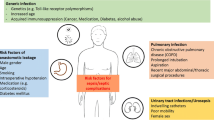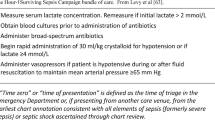Abstract
Background
Uncomplicated acute appendicitis has been managed traditionally by early appendicectomy. However, recently, there has been increasing interest in the potential for primary treatment with antibiotics, with studies finding this to be associated with fewer complications than appendicectomy. The aim of this study was to compare outcomes of antibiotic therapy with appendicectomy for uncomplicated acute appendicitis.
Method
This meta-analysis of randomised controlled trials included adult patients presenting with uncomplicated acute appendicitis treated with antibiotics or appendicectomy. The primary outcome measure was complications. Secondary outcomes included treatment efficacy, hospital length of stay (LOS), readmission rate and incidence of complicated appendicitis.
Results
Five randomised controlled trials with a total of 1430 participants (727 undergoing antibiotic therapy and 703 undergoing appendicectomy) were included. There was a 39 % risk reduction in overall complication rates in those treated with antibiotics compared with those undergoing appendicectomy (RR 0.61, 95 % CI 0.44–0.83, p = 0.002). There was no significant difference in hospital LOS (mean difference 0.25 days, 95 % CI −0.05 to 0.56, p = 0.10). In the antibiotic cohort, 123 of 587 patients initially treated successfully with antibiotics were readmitted with symptoms suspicious of recurrent appendicitis. The incidence of complicated appendicitis was not increased in patients who underwent appendicectomy after “failed” antibiotic treatment (10.8 %) versus those who underwent primary appendicectomy (17.9 %).
Conclusion
Increasing evidence supports the primary treatment of acute uncomplicated appendicitis with antibiotics, in terms of complications, hospital LOS and risk of complicated appendicitis. Antibiotics should be prescribed once a diagnosis of acute appendicitis is made or considered.




Similar content being viewed by others
Abbreviations
- LOS:
-
Hospital length of stay
- IQR:
-
Interquartile range
- RR:
-
Risk ratio
- CI:
-
Confidence interval
References
Coldrey E (1956) Treatment of acute appendicitis. Br Med J 2:1458–1461
Minutolo V, Licciardello A, Di Stefano B et al (2014) Outcomes and cost analysis of laparoscopic versus open appendectomy for treatment of acute appendicitis: 4-years experience in a district hospital. BMC Surg 14:14
Ward NT, Ramamoorthy SL, Chang DC et al. (2014) Laparoscopic appendectomy is safer than open appendectomy in an elderly population JSLS 18: pii: e2014.00322
Li X, Zhang J, Sang L et al (2010) Laparoscopic versus conventional appendectomy—a meta-analysis of randomized controlled trials. BMC Gastroenterol 10:129
Anderson JE, Bickler SW, Chang DC et al (2012) Examining a common disease with unknown etiology: trends in epidemiology and surgical management of appendicitis in California, 1995–2009. World J Surg 36:2787–2794. doi:10.1007/s00268-012-1749-z
Andersson RE, Hugander A, Thulin AJ (1992) Diagnostic accuracy and perforation rate in appendicitis: association with age and sex of the patient and with appendicectomy rate. Eur J Surg 158:37–41
Di Saverio S, Sibilio A, Giorgini E et al (2014) The NOTA Study (Non Operative Treatment for Acute Appendicitis): prospective study on the efficacy and safety of antibiotics (amoxicillin and clavulanic acid) for treating patients with right lower quadrant abdominal pain and long-term follow-up of conservatively treated suspected appendicitis. Ann Surg 260:109–117
Flum DR (2015) Clinical practice. Acute appendicitis–appendectomy or the “antibiotics first” strategy. N Engl J Med 372:1937–1943
Gorter RR, van der Lee JH, Cense HA et al (2015) Initial antibiotic treatment for acute simple appendicitis in children is safe: short-term results from a multicenter, prospective cohort study. Surgery 157:916–923
Svensson JF, Patkova B, Almstrom M et al (2015) Nonoperative treatment with antibiotics versus surgery for acute nonperforated appendicitis in children: a pilot randomized controlled trial. Ann Surg 261:67–71
Park HC, Kim MJ, Lee BH (2014) The outcome of antibiotic therapy for uncomplicated appendicitis with diameters ≤10 mm. Int J Surg 12:897–900
Koike Y, Uchida K, Matsushita K et al (2014) Intraluminal appendiceal fluid is a predictive factor for recurrent appendicitis after initial successful non-operative management of uncomplicated appendicitis in pediatric patients. J Pediatr Surg 49:1116–1121
Assarsson J, Korner U, Lundholm K (2014) Evaluation of procalcitonin as a marker to predict antibiotic response in adult patients with acute appendicitis: a prospective observational study. Surg Infect (Larchmt) 15:601–605
Okus A, Ay S, Karahan O et al (2015) Monitoring C-reactive protein levels during medical management of acute appendicitis to predict the need for surgery. Surg Today 45:451–456
Kirby A, Hobson RP, Burke D et al (2015) Appendicectomy for suspected uncomplicated appendicitis is associated with fewer complications than conservative antibiotic management: a meta-analysis of post-intervention complications. J Infect 70:105–110
Anonymous (2014) Antibiotic therapy for acute appendicitis in adults. Fewer immediate complications than with surgery, but more subsequent failures Prescrire Int 23:158–160
Wilms IM, de Hoog DE, de Visser DC et al (2011) Appendectomy versus antibiotic treatment for acute appendicitis. Cochrane Database Syst Rev 11:CD008359
Varadhan KK, Neal KR, Lobo DN (2012) Safety and efficacy of antibiotics compared with appendicectomy for treatment of uncomplicated acute appendicitis: meta-analysis of randomised controlled trials. BMJ 344:e2156
Hansson J, Korner U, Khorram-Manesh A et al (2009) Randomized clinical trial of antibiotic therapy versus appendicectomy as primary treatment of acute appendicitis in unselected patients. Br J Surg 96:473–481
Vons C, Barry C, Maitre S et al (2011) Amoxicillin plus clavulanic acid versus appendicectomy for treatment of acute uncomplicated appendicitis: an open-label, non-inferiority, randomised controlled trial. Lancet 377:1573–1579
Styrud J, Eriksson S, Nilsson I et al (2006) Appendectomy versus antibiotic treatment in acute appendicitis. a prospective multicenter randomized controlled trial. World J Surg 30:1033–1037. doi:10.1007/s00268-005-0304-6
Eriksson S, Granstrom L (1995) Randomized controlled trial of appendicectomy versus antibiotic therapy for acute appendicitis. Br J Surg 82:166–169
Bakker OJ (2012) Should conservative treatment of appendicitis be first line? BMJ 344:e2546
Davies S, Peckham-Cooper A, Sverrisdottir A (2012) Case-based review: conservative management of appendicitis—are we delaying the inevitable? Ann R Coll Surg Engl 94:232–234
Salminen P, Paajanen H, Rautio T et al (2015) Antibiotic therapy vs appendectomy for treatment of uncomplicated acute appendicitis: the APPAC randomized clinical trial. JAMA 313:2340–2348
Kelly ME, Khan A, Ur Rehman J et al (2015) A national evaluation of the conservative management of uncomplicated acute appendicitis: how common is this and what are the issues? Dig Surg 32:325–330
Moher D, Liberati A, Tetzlaff J et al (2010) Preferred reporting items for systematic reviews and meta-analyses: the PRISMA statement. Int J Surg 8:336–341
Review Manager (Version 5.3), Cochrane Collaboration, UK, 2014
Higgins JP, Thompson SG (2002) Quantifying heterogeneity in a meta-analysis Stat Med 21:1539–1558
GRADEpro Version 3.6, Cochrane Collaboration, 2015
Malik AA, Bari SU (2009) Conservative management of acute appendicitis. J Gastrointest Surg 13:966–970
Turhan AN, Kapan S, Kutukcu E et al (2009) Comparison of operative and non operative management of acute appendicitis. Ulus Travma Acil Cerrahi Derg 15:459–462
Xiong B, Zhong B, Li Z et al (2015) Diagnostic accuracy of noncontrast CT in detecting acute appendicitis: a meta-analysis of prospective studies. Am Surg 81:626–629
Shindoh J, Niwa H, Kawai K et al (2010) Predictive factors for negative outcomes in initial non-operative management of suspected appendicitis. J Gastrointest Surg 14:309–314
Leeuwenburgh MM, Wiezer MJ, Wiarda BM et al (2014) Accuracy of MRI compared with ultrasound imaging and selective use of CT to discriminate simple from perforated appendicitis. Br J Surg 101:e147–e155
Cobben LP, de Van Otterloo AM, Puylaert JB (2000) Spontaneously resolving appendicitis: frequency and natural history in 60 patients. Radiology 215:349–352
Andersson RE (2007) The natural history and traditional management of appendicitis revisited: spontaneous resolution and predominance of prehospital perforations imply that a correct diagnosis is more important than an early diagnosis. World J Surg 31:86–92. doi:10.1007/s00268-006-0056-y
Carr NJ (2000) The pathology of acute appendicitis. Ann Diagn Pathol 4:46–58
Choudhary RK, Hassn AM (2003) Managing acute appendicitis. Neuroimmune appendicitis may be distinct pathological entity BMJ 326:49
Funding
KER was funded by a Research Fellowship from the European Society for Clinical Nutrition and Metabolism (ESPEN). The funders had no role in the design, execution and writing up of the study.
Author information
Authors and Affiliations
Corresponding author
Ethics declarations
Conflict of Interests
None of the authors has a conflict of interest to declare.
Additional information
This paper was presented at the Annual Meeting of the Society for Academic and Research Surgery, London, January 2016. It has been published in abstract form - Br J Surg 2016; 103 (S3): 34.
Rights and permissions
About this article
Cite this article
Rollins, K.E., Varadhan, K.K., Neal, K.R. et al. Antibiotics Versus Appendicectomy for the Treatment of Uncomplicated Acute Appendicitis: An Updated Meta-Analysis of Randomised Controlled Trials. World J Surg 40, 2305–2318 (2016). https://doi.org/10.1007/s00268-016-3561-7
Published:
Issue Date:
DOI: https://doi.org/10.1007/s00268-016-3561-7




